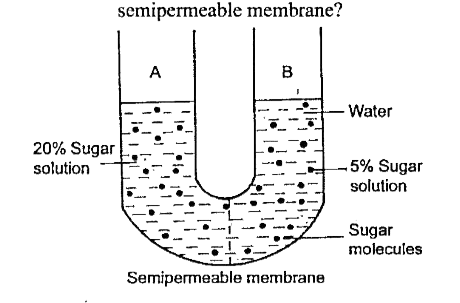Why is the cell membrane called a selectively permeable membrane?
Step-by-Step Solution:
1. Definition of Selectively Permeable: The term "selectively permeable" refers to a property of certain membranes that allows only specific substances to pass through while blocking others.
2. Function of the Cell Membrane: The cell membrane is the outer boundary of a cell. It serves as a barrier that separates the internal environment of the cell from the external environment.
3. Selective Passage: The cell membrane allows only certain molecules and ions to enter or exit the cell. This means that not all substances can freely pass through the membrane.
4. Importance of Selectivity: This selectivity is crucial for maintaining homeostasis within the cell, as it ensures that essential nutrients can enter the cell while waste products and harmful substances are kept out.
5. Mechanisms of Selectivity: The cell membrane contains proteins and other molecules that help in the selective transport of substances. These proteins can act as channels or carriers for specific molecules.
6. Conclusion: Therefore, the cell membrane is called a selectively permeable membrane because it selectively allows certain substances to pass through while restricting others.
---
Topper's Solved these Questions
- THE CELL BOOK - ICSECHAPTER - THE CELL EXERCISE - Exercises (Answer the following in detail.)
7 Videos
- THE CELL BOOK - ICSECHAPTER - THE CELL EXERCISE - Exercises
1 Videos
- THE CELL BOOK - ICSECHAPTER - THE CELL EXERCISE - Exercises (true or false.)
5 Videos
- TEST PAPER 2BOOK - ICSECHAPTER - TEST PAPER 2EXERCISE - Label the schematic diagram
1 Videos
- THE CIRCULATORY SYSTEMBOOK - ICSECHAPTER - THE CIRCULATORY SYSTEMEXERCISE - REVIEW QUESTIONS (Long answer questions)
4 Videos
Similar Questions
Knowledge Check
An example of selectively permeable membrane is:
AplasmalemmaBcell wallCchloroplast membraneDmitochondrial membrane
Cell membrane is
View SolutionCell membrane is
View SolutionA membrane which allows certain substances to pass through it, but not others is called a selectively permeable membrane.
View SolutionStudy the set-up given in the diagram and answer the following questions:

Why is the membrane called semipermeable membrane?
View SolutionThe cell membrane has holes.
View SolutionThe selectively permeable membrane of the cell is
View SolutionState whether the following statement is true or false.
A membrane which allows certain substances to pass, but does not allow others to pass through it is called a selectively permeable membrane.
A. True
B. False
View Solution
